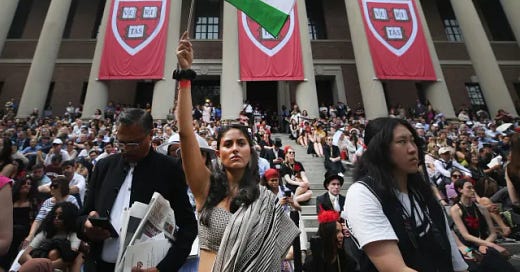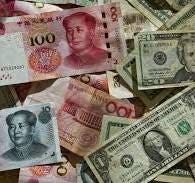Harvard’s Cash Cow Just Got Deported
Trump’s visa ban revealed the inconvenient truth: elite schools run on yuan, not Yankee grit.
In a not-so-unexpected twist, the Trump administration recently pulled Harvard’s golden plug by halting its ability to enroll foreign students. Officially, the reason was Harvard’s failure to disclose immigration data as required by law.
However, what began as yet another immigration battle in the courts may have turned into an unintended intervention. Like ripping the duct tape off a leaky water main, Trump’s move has exposed a far deeper problem: America’s elite private schools aren’t merely educating the world; they’re also being financially resuscitated by it.
Once upon a time, the American Dream promised that any hardworking citizen could earn a world-class education on home soil. However, walk the halls of any Ivy League university or elite boarding school. You’ll discover a striking truth: the financial engines of many of these institutions are no longer fueled by American families, but by foreign "aid" in the form of full-tuition international students.
Let’s call it what it is: a tuition cartel quietly propped up by foreign aid. However, this time, it’s not the U.S. sending money overseas; it’s Shanghai and Seoul bailing out Cambridge, and more broadly, an unsustainable model of private education across the United States.
You see, Harvard and its Ivy League counterparts aren’t universities anymore. They’ve become boutique global investment vehicles with libraries. Nearly 27% of undergraduates at Harvard are international students, and they’re not just there for cultural exchange; they're the cash cows of the modern academy.
The pattern is even more striking in the realm of private high schools, especially boarding institutions. Chinese nationals comprise 24% of international K–12 students, predominantly in grades 9–12. Almost all of them pay full sticker price. Our schools have exchanged the American Dream for a more profitable arrangement: full-pay foreign students who can wire $80,000 a year faster than a Boston scion can say, “But my dad donated a squash court.”

This revenue isn’t just padding endowments; it’s keeping the lights on. It conceals the excesses of ever-expanding university bureaucracies. If they eliminated the “foreign aid,” tuition would spike even further for the diminishing number of American families who can afford it.
Now that the Trump administration has pulled the visa rug out from under Harvard, it’s not just an immigration debate; it’s a liquidity crisis. The panic behind closed doors on campuses revolves less around culture and more around cash flow. “We value global voices!” the university press statements scream, carefully avoiding the fine print: as long as those voices come with an offshore bank account.
Behind the glossy brochures and DEI statements recently hidden from plain view at universities everywhere lies a harsh reality: universities and independent schools are making financial decisions under the guise of moral purpose. They are leveraging diversity not as an educational benefit, but as an economic necessity.
Diversity or Dollars? Yes.
Sure, schools claim they recruit international students to encourage diverse perspectives. However, suppose the average applicant from Iowa generated the same revenue as a student from Guangdong. In that case, you'd see a lot more corn-fed freshmen and fewer Chinese WeChat groups named “Harvard ’29 Admits.” Let’s be honest: “need-blind” has become less of a promise and more of a punchline. Schools are perfectly blind to your needs, as long as you can pay in full.
Meanwhile, American families face college tuition bills exceeding $70K and declining acceptance rates. They wonder when they unknowingly entered a game of musical chairs in which a quarter has been outsourced to China. Admissions slots once set aside for promising local talent are now allocated to foreign applicants who can afford the full tuition without hesitation. Worst of all, the notion of upward mobility through education, once the cornerstone of the American promise, is being quietly auctioned off.
It’s not just a question of numbers; it’s a question of national purpose. Should America’s elite educational institutions operate as global businesses first and civic engines second? Should the son of a Boston mechanic lose a spot at MIT to accommodate a Shanghai billionaire’s child who doesn’t require financial aid?
The result is a generation of American kids priced out of institutions created to serve them. At the same time, Harvard's CFO prays that Beijing’s next currency devaluation doesn’t trigger a campus budget freeze.
Shrink the Bureaucracy, Not the Dream
To be clear, international students bring value. Many are brilliant, and many go on to contribute meaningfully to the U.S. economy. This isn’t a call for academic nationalism. It’s a call for honesty. It’s time our institutions stopped pretending that their foreign enrollment strategies are driven by principle; they’re driven by overhead and payroll.
If America’s private schools want to stay true to their mission, they must first recognize how dependent they have become on foreign dollars for survival. Then, they need to take the more challenging step of reforming themselves so they don’t have to.
And Harvard? It’s about to discover what many of us have known for years. If your business model relies on selling American education to the highest foreign bidder, you might be in the wrong business.







As a private institution, Harvard and other schools are free to accept or reject whoever they want. BUT not on the taxpayers dime. If they are so sure that their academic model is right then they should put their money where their mouth is and give up gov’t subsidies, like Hillsdale College did.
I’ll even help them trim costs. One example, don’t pay Elizabeth Warren $400K+ to teach one class for one semester.